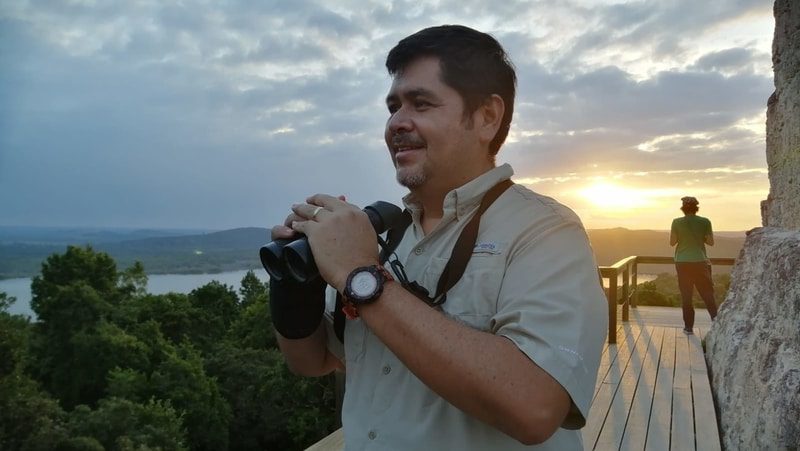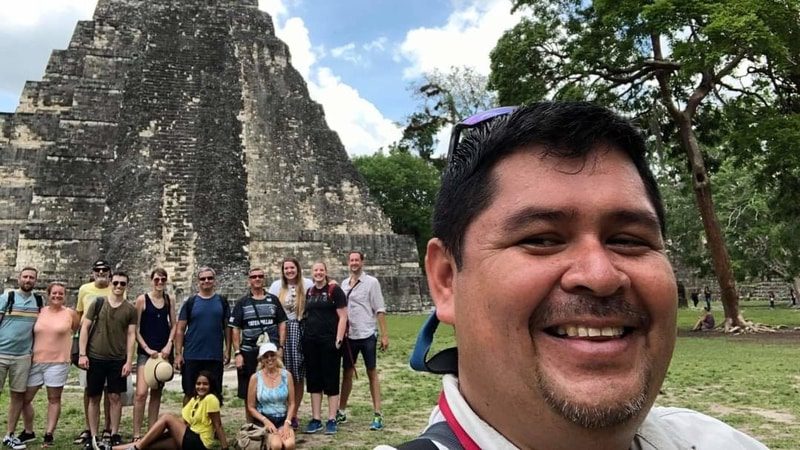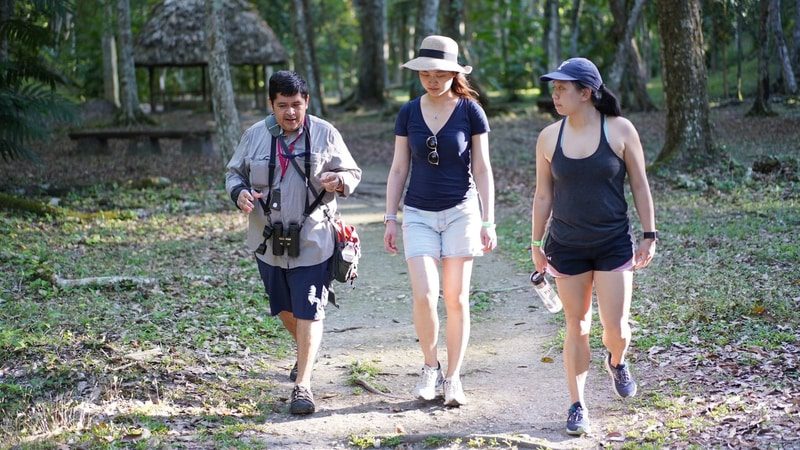
Luis Felipe Guerra is Intrepid's Deputy Chief Operating Officer Guatemala, but he is also Maya, and a tour guide. As a child, he struggled to come to terms with his Aboriginal heritage, as he regularly encountered racism. By discovering more about his history and sharing it with travelers, he learned to be proud of his heritage. Now he wants young Guatemalans to do the same.
When my father was a kid in Guatemala, he wasn't allowed to speak the Mayan language in class. If he said a word in Maya, my grandfather would have to pay a fine, and my father would be punished. He used to tell me of being made to kneel on kernels of corn while holding a chair against his back, often for hours.
I come from a mestizo background, which means I have mixed indigenous and European ancestry. My father, Maya, is from the Baqam tribe, but my mother is European. I was born in the far north of the Petén region of Guatemala, and I spent much of my childhood in one of our greatest Mayan cities, Tikal, which is now a UNESCO World Heritage Site.

My dad used to work for an airline that flew to Tikal, and eventually he became a lifeguard there. I remember my brothers and me bringing him lunch and playing among the ruins, watching the archaeologists do their work. This is where I first saw the tour guides showing visitors around the site. As I watched these travelers, overwhelmed by the beauty of the pyramids, I think this was the moment, without knowing it, when my heart fell in love with tourism. I was hooked.
When I was growing up, Guatemala was a very racist country, and being indigenous was nothing to be proud of. Like my father, I was discriminated against at school. It took 36 years of civil war and hundreds of thousands of lives to turn things around. Guatemala experienced one of the longest continuous civil conflicts in South America, which ran from 1960 to 1996, and when it ended, respect for all the indigenous peoples of the country was one of the peace terms drawn up by the rebels. It was a horrible struggle, but because of that war, my children are now learning the Mayan language in school! Children can wear traditional Maya dress in place of the school uniform. It's not perfect, and we still have a long way to go, but if you compare the culture now to my parents' generation, it was a total 180-degree change.
In my own trip, tourism has played a huge role. I ended up in high school helping a lot of kids get involved in the travel industry. This is where I met Mario, an archaeologist. It was my first direct contact with Mayan history. Mario told our class about the equinoxes and how the Mayans planned to cultivate them by following astronomical events, by learning the rhythm of the seasons. I told him that I learned that from my grandfather and that my grandfather is Indian. Mario corrected me and said, “Louis, your grandfather isn't Indian. He's the Mayans.”
Mario was the first to make me feel proud of my Aboriginal heritage, and helped me become a tour guide. I started driving tours before I even finished high school! I fell in love with it, and decided this was what I wanted to do for the rest of my life. Even now, when I'm not working and have a weekend to myself, I go and take a walk around the ruins. I have a passion for sharing the history of my people, for sharing thousands of years of civilization with anyone who wants to know about it.
As I watched these travelers, overwhelmed by the beauty of the pyramids, I think this was the moment, without knowing it, when my heart fell in love with tourism. I was hooked.
It's all an educational process, even for the tour guides. Once, when I was walking by a stone monument in Tikal, I saw a guide reading hieroglyphs to a group. His name was Antonio, and he is from the Kaqchikel Maya people. Until that day, I didn't know anyone could read those hieroglyphs, let alone tour guides! So I waited for him to finish his lecture, then went up and asked if he could share his knowledge with me. He smiled and said, "Of course!"
So Antonio started tutoring me, and through him I got a place at the University of Texas. From 2003 to 2009, she attended classes in Texas and learned how to read Maya hieroglyphs. This is what I love most about being a tour guide. Imagine the stone carvings, made 1,300 or 1,700 years ago, and I am now able to read those carvings; The words that come out of my mouth were written by someone thousands of years ago. I can read their thoughts and speak with the voice of the Maya. It is an honor to share this knowledge with travelers.

I expect tourism to become the number one industry in Guatemala over the next few years. Our government isn't perfect, but they're slowly protecting more historic sites, trying to encourage investment in tourism, and there are a lot of really encouraging stories. For the past few years, I've been working on the Intrepid Action Plan for the Indigenous Peoples of Central America. It is our roadmap for bringing Indigenous communities into tourism, and educating our clients about Indigenous history and culture. We want to get to the point where Indigenous children feel that travel is a legitimate career choice. We want to help them enter the industry through apprenticeships. Most of all, we want to offer people a different path.
I know one teenager, for example, Juanito, who lives in highland communities and speaks at least eight different languages—French, Hebrew, Italian, Spanish, and several Mayan dialects. He learns by meeting travelers and selling goods to them. Now this child can leave his community and become a translator or a tour guide. Stories like these are repeated across the country. Boys and girls who become great leaders, improving their quality of life by moving from agriculture to tourism.
It is something that changed my life. After becoming a park ranger, my father became a taxi driver who ferried foreigners from Flores to Tikal. I paid that taxi for my sister's education, and I paid for my brothers and sisters. My father only had a first-grade education, and my mother only got a sixth-grade education, but that's the beauty of tourism. Anyone can do it. There are no restrictions in your way. My family has made it their way to travel, and it has changed our lives for the better.
Source link
0 Comments